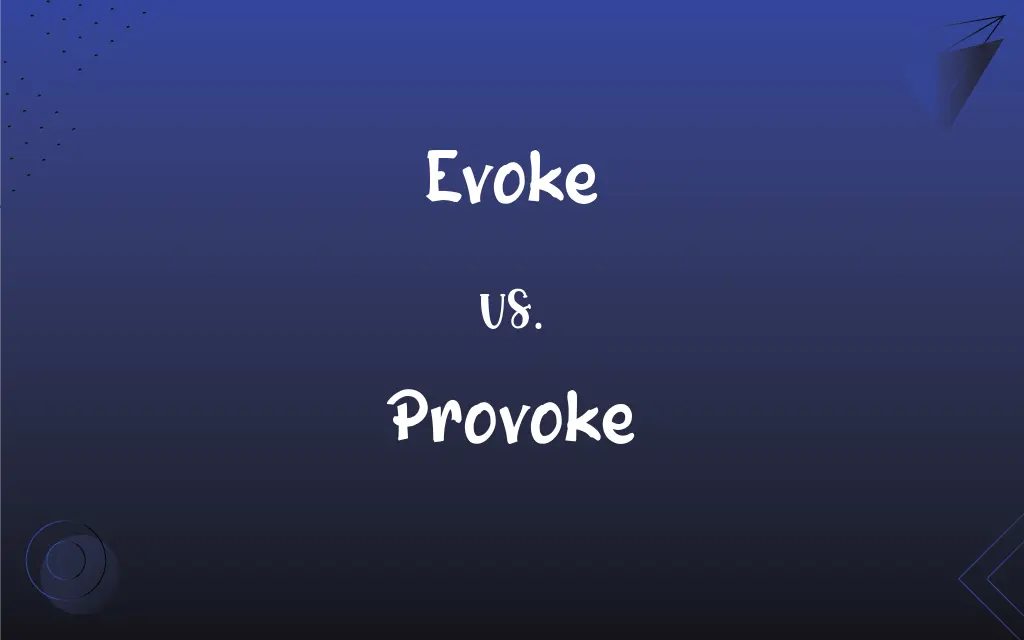Evoke vs. Provoke: What's the Difference?
Edited by Harlon Moss || By Janet White || Updated on September 28, 2023
Evoke generally means to call forth feelings, thoughts, or images; Provoke often means to incite or stimulate into action, usually negatively.

Key Differences
"Evoke" primarily refers to the act of bringing out emotions, memories, or responses that are already present within someone. "Provoke," on the other hand, commonly indicates causing someone to react, typically in a strong and often negative manner.
In the context of emotional response, "evoke" is generally more subtle, aiming to draw out feelings that are latent or dormant. "Provoke" usually aims to stir up emotions, and the reaction is generally more immediate and intense.
When talking about ideas or memories, "evoke" implies a kind of summoning, as if the idea or memory was waiting to be called forth. "Provoke" in the realm of ideas implies a challenge or confrontation that compels one to think or respond.
In literary or artistic contexts, "evoke" would be used to describe how a piece of work brings certain emotions or images to mind. "Provoke" would describe a work that challenges or stimulates thought, often pushing the boundaries of convention or comfort.
From a grammatical perspective, both "evoke" and "provoke" are transitive verbs, which means they require an object to complete their meaning. However, "evoke" is more frequently used with abstract objects like "emotions," while "provoke" is often used with more concrete objects like "reaction."
ADVERTISEMENT
Comparison Chart
Connotation
Neutral or Positive
Usually Negative
Typical Objects
Abstract (e.g., feelings, memories)
Concrete (e.g., actions, reactions)
Intensity
Generally Subtle
Usually Immediate and Intense
Usage Context
Artistic, Psychological
Social, Behavioral
Grammatical Role
Transitive Verb
Transitive Verb
ADVERTISEMENT
Evoke and Provoke Definitions
Evoke
To elicit a reaction
His words evoked laughter.
Provoke
To annoy or irritate
Your comment provoked her.
Evoke
To cause to appear
The magician evoked a rabbit from the hat.
Provoke
To challenge or confront
The statement provoked thought.
Evoke
To bring to mind
The painting evoked her childhood.
Provoke
To elicit an emotional response
The news provoked outrage.
Evoke
To summon forth
The music evoked deep emotions.
Provoke
To stimulate a reaction
The stimulus provoked a nerve response.
Evoke
To give rise to; draw forth; produce
Words that evoked a smile.
Actions that evoked mistrust.
Provoke
To incite to anger or resentment
Taunts that provoked their rivals.
Evoke
To call to mind, as by suggestion, association, or reference
Songs that evoke old memories.
A speech that evoked the words of Jefferson.
Provoke
To stir to action or feeling
A remark that provoked me to reconsider.
Evoke
To create anew, especially by means of the imagination
A novel that accurately evokes the Depression.
Provoke
To give rise to; bring about
A miscue that provoked laughter.
News that provoked an uproar.
Evoke
To summon by magical or supernatural power; conjure.
Provoke
To bring about deliberately; induce
Provoke a fight.
Evoke
To call out; to draw out or bring forth.
Provoke
(transitive) To cause someone to become annoyed or angry.
Don't provoke the dog; it may try to bite you.
Evoke
To cause the manifestation of something (emotion, picture, etc.) in someone's mind or imagination.
Being here evokes long forgotten memories.
Seeing this happen equally evokes fear and anger in me.
The book evokes a detailed and lively picture of what life was like in the 19th century.
Provoke
(transitive) To bring about a reaction.
Evoke
To elicit a response.
Provoke
(obsolete) To appeal.
Evoke
To call out; to summon forth.
To evoke the queen of the fairies.
A regulating discipline of exercise, that whilst evoking the human energies, will not suffer them to be wasted.
Provoke
To call forth; to call into being or action; esp., to incense to action, a faculty or passion, as love, hate, or ambition; hence, commonly, to incite, as a person, to action by a challenge, by taunts, or by defiance; to exasperate; to irritate; to offend intolerably; to cause to retaliate.
Obey his voice, provoke him not.
Ye fathers, provoke not your children to wrath.
Such actsOf contumacy will provoke the HighestTo make death in us live.
Can honor's voice provoke the silent dust?
To the poet the meaning is what he pleases to make it, what it provokes in his own soul.
Evoke
To call away; to remove from one tribunal to another.
Provoke
To cause provocation or anger.
Evoke
Call forth (emotions, feelings, and responses);
Arouse pity
Raise a smile
Evoke sympathy
Provoke
To appeal. [A Latinism]
Evoke
Call forth;
Her behavior provoked a quarrel between the couple
Provoke
Call forth (emotions, feelings, and responses);
Arouse pity
Raise a smile
Evoke sympathy
Evoke
Deduce (a principle) or construe (a meaning);
We drew out some interesting linguistic data from the native informant
Provoke
Call forth;
Her behavior provoked a quarrel between the couple
Evoke
Evoke or call forth, with or as if by magic;
Raise the specter of unemployment
He conjured wild birds in the air
Stir a disturbance
Call down the spirits from the mountain
Provoke
Provide the needed stimulus for
Evoke
Call to mind or evoke
Provoke
Annoy continually or chronically;
He is known to harry his staff when he is overworked
This man harasses his female co-workers
Evoke
To conjure an image
The story evoked a vivid picture.
Provoke
To incite to action
His taunts provoked a fight.
FAQs
Is "evoke" always positive?
Not necessarily; it is generally neutral but can be positive depending on context.
Can "evoke" and "provoke" be used interchangeably?
Generally no, they carry different nuances and contexts.
What is the basic meaning of "provoke"?
Provoke means to incite or stimulate into action, often negatively.
Can "evoke" be used in artistic contexts?
Yes, artworks or music can evoke emotions or images.
What is commonly evoked?
Emotions, memories, or thoughts are commonly evoked.
Is "provoke" always negative?
Mostly, although it can be neutral when it means to stimulate thought or discussion.
Can "provoke" be used in political contexts?
Yes, statements or actions can provoke debate or conflict.
What is the past tense of "evoke"?
The past tense is "evoked."
What is the basic meaning of "evoke"?
Evoke means to bring forth or call to mind emotions, images, or memories.
Are both "evoke" and "provoke" transitive verbs?
Yes, both are transitive verbs and require an object.
What is commonly provoked?
Actions, reactions, or strong emotional responses are commonly provoked.
What is the past tense of "provoke"?
The past tense is "provoked."
What is a synonym for "evoke"?
A synonym could be "elicit."
What is a synonym for "provoke"?
A synonym could be "incite."
Can "evoke" be used in a scientific context?
Yes, certain stimuli can evoke responses in scientific experiments.
About Author
Written by
Janet WhiteJanet White has been an esteemed writer and blogger for Difference Wiki. Holding a Master's degree in Science and Medical Journalism from the prestigious Boston University, she has consistently demonstrated her expertise and passion for her field. When she's not immersed in her work, Janet relishes her time exercising, delving into a good book, and cherishing moments with friends and family.
Edited by
Harlon MossHarlon is a seasoned quality moderator and accomplished content writer for Difference Wiki. An alumnus of the prestigious University of California, he earned his degree in Computer Science. Leveraging his academic background, Harlon brings a meticulous and informed perspective to his work, ensuring content accuracy and excellence.































































